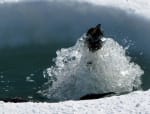Today in Nature: Results of the GRB neutrino search
Although cosmic rays were discovered 100 years ago, their origin remains one of the most enduring mysteries in physics. Now, the IceCube Neutrino Observatory, a massive detector in Antarctica, is honing in on how the highest energy cosmic rays are produced. […]








